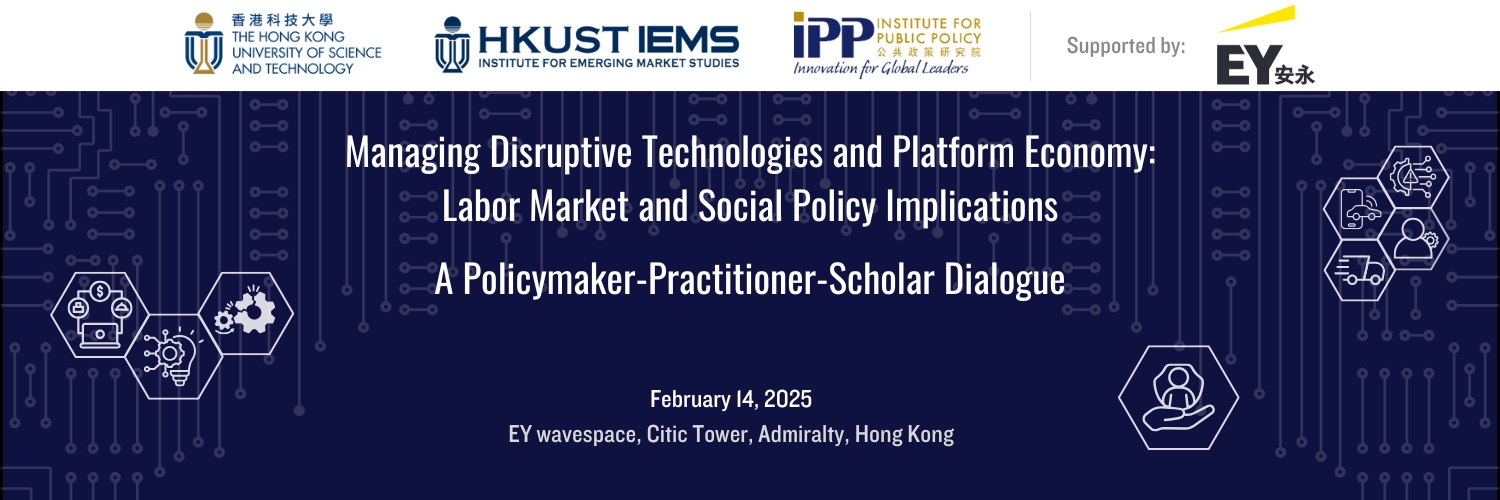International Conference: Managing Disruptive Technologies and Platform Economy: Labor Market and Social Policy Implications
SHARE THIS

| Various | |
| Friday 14 February 2025 at 9:00 am - 6:00 pm (Hong Kong time, GMT +8) | |
|
(Invited Guests only) 22/F, EY wavespace, Citic Tower, Admiralty, Hong Kong |
The talk was held successfully on 14 Feb 2025. Read our news update for more details.
As the Fourth Industrial Revolution reshapes the global industrial landscape through advancements in automation, artificial intelligence (AI), and platformization, the implications for labor markets and social policies are profound and far-reaching. This transformation is not only redefining the nature of work but also challenging existing frameworks of labor protection and social security systems.
This event will explore the rapid technological changes impacting industries and the corresponding shifts required in social policies to mitigate adverse effects. Key topics will include the need for enhanced labor protections in an increasingly automated environment, strategies for addressing unemployment in the age of AI, and the critical importance of human capital development in sustaining economic competitiveness.
The conference will mainly discuss the following topics, but not limited to:
- Challenges to Platform Work and Labor Regulation in China
- Disruptive Technologies and Their Effects on the Labor Market and Social Protection
- The Intersection of New Technologies and Migration
- Food Delivery Services: Challenges in Hong Kong and Europe
- Policy Responses: Balancing Wages and Welfare for Platform Workers in Singapore
- Automated Delivery in the Context of ‘New Quality Productive Forces’
- Welfare Policy and Social Protection
Join us as we delve into comprehensive discussions led by experts in technology, economics, and social policy. This session aims to provide insights from a recent study that examines these issues, offering a platform for policymakers, industry leaders, government officials, and academic professionals to exchange ideas and formulate strategies for an equitable technological future.
Organizers
- HKUST Institute for Emerging Market Studies (IEMS)
- HKUST Institute for Public Policy (IPP)
Supported by
- EY
Program
Speaker List
The sequence of speakers is organized according to the timeline of the conference agenda.
- Professor Alex Jingwei He, Acting Director, Institute for Public Policy; Associate Professor, Division of Public Policy, HKUST
- Mr Vincent Chan, MH, Greater Bay Area Technology and Data Connect Leader, Ernst & Young, Hong Kong
- Professor Kar Yan Tam, Vice President (Business and Administration), HKUST
- Professor Bert Shi, Department of Electronic and Computer Engineering; Special Advisor to the Vice President (Research & Development), HKUST
- Professor Albert Park, Chief Economist, Asian Development Bank
- Dr. Hon Wendy Wen Hong, Member of the Legislative Council, Hong Kong Special Administrative Region
- Professor Yike Guo, Provost and Chair Professor of Computer Science and Engineering, HKUST
- Mr. Chris Leung, Partner, Financial Services Technology Consulting, Ernst & Young Advisory Services Limited
- Professor Naubahar Sharif, Head of Division of Public Policy, HKUST
- Mr. Pak Ting, CEO, Votee AI
- Dr. Wei Tu, Law Specialist, Beijing Office, International Labour Organization
- Dr. Tat-chor Au-Yeung, Assistant Professor, Department of Sociology and Social Policy, Lingnan University, Hong Kong SAR
- Professor Yongshun Cai, Head of Division of Social Sciences, HKUST
- Dr. Mahdi Ghodsi, Economist, The Vienna Institute for International Economic Studies, Austria
- Dr. Li Sun, Associate Professor, School of Sociology and Social Policy, University of Leeds, UK
- Dr. Zhen Jie Im, Postdoctoral Researcher, LUT University, Finland
- Ms. Justine Hoi-man Lam and Mr. Tak-ching Mak, Organizers, Riders' Rights Concern Group, Hong Kong Christian Industrial Committee
- Professor Kira Matus, Associate Dean, Academy for Interdisciplinary Studies, HKUST
- Dr. Mathew Mathews, Principal Research Fellow, Institute of Policy Studies, National University of Singapore
- Mr. Hui Zeng, Director of Policy and Strategy, Meituan
- Prof. Dr. Marius Busemeyer, Professor of Political Science, University of Konstanz, Germany
- Dr. Mandy Sin-man Wong, District Councilor, Central and Western District Council, Hong Kong SAR
- Ms. Mei Lin Wu, Director, Hong Kong Women Workers’ Association
- Mr. Dicky Chow, Senior Researcher and Head of Healthcare & Social Innovation, Our Hong Kong Foundation
- Dr. Ziteng Fan, Institute for Global Public Policy, Fudan University, China
- Dr. Jing Ning, School of Government, University of International Business and Economics, China
Live-stream on Zoom
While in-person attendance is by invitation only, all are welcome to join the live streaming via Zoom free of charge.
Register here
Get updates from HKUST IEMS






